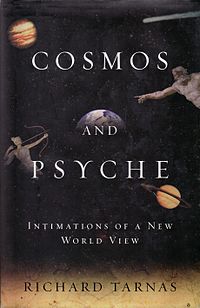Richard Tarnas is a
spiritually oriented author based in California, where he teaches at a private
college, the California Institute of Integral Studies. His worldview seems to
be broadly Jungian, and probably also has affinities with Steiner's
Anthroposophy and Aurobindo's teachings. Tarnas' most acclaimed work, "The
Passion of the Western Mind", is apparently used as a college textbook in
the United States. This book, "Cosmos and Psyche" is less popular
outside strictly spiritual circles, and was even attacked in the Wall Street
Journal! Tarnas attempts to prove a variant of astrology, and expands on themes
already touched upon in an ealier essay, "Prometheus the Awakener",
reviewed by me elsewhere.
I read some chapters of "Cosmos and Psyche", and skimmed others. The book is incredibly dense. Unfortunately, the more I read and reflected, the less convincing "Cosmos and Psyche" became. The author, Richard Tarnas, believes in astrology and claims to have found a large number of correlations between earthly events and planetary alignments in the sky. There are many problems with his method, however.
First, he discusses a large number of such alignments: Uranus-Pluto, Uranus-Neptune, Pluto-Saturn, Uranus-Neptune-Pluto, etc. Second, he believes that their influence is usually contradictory and multivalent. Thus, it's relatively easy to find *some* correlation between earthly events and the motion of the planets. A liberating revolution with a darker side (and there are many of them) can be correlated with any number of planets! So can just about any cultural or literary development. Third, even with such a large net, some events seem difficult to pin down astrologically, including the Russian revolution of 1917 or the Chinese revolution of 1949. They seem to be hanging in the air (or from the sky?) as astrological anomalies. Fourth, the author's interpretations are often subjective. Why is the creation of Israel seen as negative, while anti-war protests in the United States are positive? Because the author is, ahem, leftist...? (I'm pretty leftist myself, BTW, but that's not the point here, unless you believe the cosmos is somehow favourable to the PLO or Ralph Nader!)
I suppose some people might also consider Tarnas to be Euro-centric, since the planets are usually connected to specifically Western developments such as the Enlightenment, the American and French revolutions, the sexual revolution of the 1960's and 1970's, etc. To his credit, Tarnas does see this problem and calls for more research on correlations between planetary movements and the development of other cultures. I nevertheless get the impression that the author has a evolutionary-teleological perspective in which the passion of the Western mind is seen as cosmically paramount (for good or for worse)... This comes from Steiner or Aurobindo, surely.
A more "in house" problem is that the author also strays from astrology as usually understood, and quite openly so. He treats all aspects as if they were both positive and negative, while a regular astrologer would argue that some aspects (such as the opposition) are usually negative, while others (such as the conjunction) are usually positive. Since Tarnas treats all planetary alignments as equal, he gets even more chances to "detect" correlations. After a while, both he and the reader get lost in a sea of multivalent archetypes, varied possibilities and a lot of mush...
The problematic method (inherited from dissident Jungian Hillman?) makes it downright impossible for Tarnas to predict the future. Both me and other reviewers are disappointed! But sure, one can probably correlate the rise of ISIS, the crisis in the Ukraine or the latest Lady Gaga clip with some planetary aspect - in retrospect. But to what end, I wonder? One could also broaden the search even more: one of Tarnas' colleagues in the camp of "archetypal cosmology", Keiron Le Grice, has discovered a brand new planetary archetype in yonder skies, the dwarf planet Eris, symbolizing the ancient goddess of war and discord. We can't say we haven't been warned...
Is there something to astrology? Who knows. As another reviewer pointed out, the universe *is* pretty weird, so weird that you probably can cram in a planetary archetype or two. Overall, however, I don't think the connection between Cosmos and Psyche (and its attendant daimons) are to be found within the covers of this dense book...

No comments:
Post a Comment